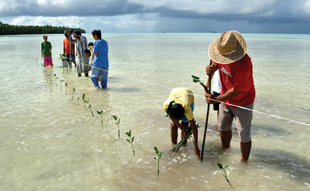| Get Risk Aware |
The Intergovernmental Panel on Climate Change (IPCC) has issued the 32-volume, 2,610-page report on the changing global climate. The report sounds a clear alarm that global climate change is accelerating and its consequences are having immediate impact on the world’s ecosystems.
Scientists warn that steps must be taken to mitigate the social impact of climate change and prepare communities to adapt to shifting environmental conditions.
This is the fifth report issued by the IPCC. The first report was published in 1990 with subsequent updates issued every 5 years. The report, prepared by teams of independent scientists noted two immediate consequences of global warming. Michael Oppenheimer, a lead scientist on the commission noted; “the first consequence is rising mortality rates due to heat waves. Last year over 35,000 people died as a result of prolonged heat waves. Another current impact of climate change is declining crop yields. The study reports that occurrences of declining crop yields dramatically rose while occurrences of increase yields steeply declined”.
Earlier reports of the IPCC advocated for the need to slow the rate of growth of carbon emissions with Cap and Trade market mechanisms. Failing to do so, the world would begin to experience the adverse effects of climate change by the close of this century. Subsequent reports indicated that evidence of climate change was growing and shortened the time frames when the impact of global warming would occur. The report released today indicates that the effects of global climate change are presently occurring and immediate action is required to mitigate the risks and adapt to the inevitable changes in the global environment.
Examples of the effects of climate change cited in the report are numerous. Persistent drought conditions in the Western United States, Australia and Sub Saharan regions and its effect on crop failures, agricultural yields, massive wildfires and water shortages. Accelerated glacial melt in the Himalayas, North America, the Polar Regions and Greenland and its impact on ocean currents, sea rise levels and massive mega storms that are growing in intensity and frequency. The thawing of permafrost soils near the Arctic Circle is releasing massive amounts of methane gas accelerating the greenhouse effect. Deforestation and clear cutting of old growth forests, and the burning of the Amazon and Indonesian flora biomass produce massive carbon emissions into the atmosphere. Paris, Beijing, Mexico City, Dallas Fort Worth and Singapore routinely experience poor air quality conditions due to excessive burning of fossil fuels.
As the evidence of global climate change proliferates the divisive politics it engenders grows. Climate change deniers seem to represent industry segments tied to the use of fossil fuels. To solve the complex problem of global climate change the diverse interests of competing stakeholders must be moderated by leaders endowed with the political will to address this multifaceted social problem.
Risk managers representing private industry, government agencies, community planners, disaster response and NGOs must fully engage the threats and opportunities presented by global climate change. Understanding the increasing velocity of this threat, its growing complexity and interconnectedness to other problems, its growing pervasiveness across regions and ecological topographies and how geophysical conditions aggregate multifaceted factors that compound the problem; make mitigation initiatives and adaptive strategies difficult to implement. Risk managers must transcend narrow parochial interests to engineer innovative solutions to these multidimensional social problems.
Sum2 understands that humans cannot escape the geophysical conditions of our earth bound home. People and communities cannot escape the realities of geophysics. Citizens are called to engage the challenge of global climate change with courage, thought leadership and inspired innovation.
Get risk aware with Macroeconomic Risk and Event App (MERA) on Google Play; a Mobile Office app that runs on MS Office and Android. MERA helps SME's assess emerging risk factors to mitigate and adapt to the challenges posed by global climate change.
risk: IPCC, Report on Global Climate Change, agriculture, aquaculture, political stability, water rights, mega storms, greenhouse gases, wildfires, air pollution, smog, deforestation, regulatory, report, climate change
You need to be a member of Global Risk Community to add comments!

Comments